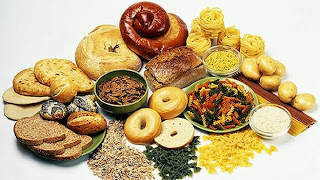Right now there is a big craze in Hollywood to eat a gluten free diet. Gwyneth Paltrow and Miley Cyrus, to name just two, have said they are gluten free and "loving it". But is it good for you?
It is said that celiac disease is one of the major under diagnosed medical problems, with an estimated 99% of people who have either gluten intolerance or celiac disease going undiagnosed. It is also estimated that 15% of the US population is gluten intolerant.
 Gluten is the protein found in wheat, rye and barley and wheat related products such as bulgur, farro, kamut, spelt and triticale and some Celiac experts also recommend including Oats in this section too. Celiac disease is an autoimmune disorder of the small intestine that occurs in genetically predisposed people of all ages from middle infancy onwards.
Gluten is the protein found in wheat, rye and barley and wheat related products such as bulgur, farro, kamut, spelt and triticale and some Celiac experts also recommend including Oats in this section too. Celiac disease is an autoimmune disorder of the small intestine that occurs in genetically predisposed people of all ages from middle infancy onwards.Symptoms for Celiac Disease:
- Pain and discomfort in the digestive tract.
- Chronic constipation and diarrhea.
- Failure to thrive (in children).
- Anaemia.
- Chronic Fatigue.
- Vitamin deficiencies.
- Iron deficiency.
- Bone or joint pain.
- Arthritis.
- Depression or anxiety.
- Bone loss or osteoporosis.
- Erratic menstrual periods.
However, lots of people are intolerant to gluten without actually having Celiac Disease. The symptoms for an intolerance to gluten are as follows:
- Digestive issues such as gas, bloating, diarrhea and constipation.
- Fatigue, brain fog or feeling tired after eating a meal that contains gluten.
- Diagnosis of an autoimmune disease such as Lupus, Psoriasis, Scleroderma, Multiple Sclerosis, Hashimoto's thyroiditis, Rheumatoid Arthritis or Ulcerative colitis.
- Neurological symptoms such as dizziness or feeling off balance.
- Hormone imbalances such as PMS, PCOS or unexplained infertility.
- Migraines.
- Diagnosis of chronic fatigue or fibromyalgia.
- Inflammation, swelling or pain in your joints such as fingers, knees or hips.
- Mood issues such as anxiety, depression, mood swing and ADD.
 The solution is easy. Eliminate all gluten from your diet. This isn't quite as easy as it sounds as lots of foods contain gluten so you will need to read the labels!
The solution is easy. Eliminate all gluten from your diet. This isn't quite as easy as it sounds as lots of foods contain gluten so you will need to read the labels!
If you suspect you have an intolerance to gluten then you can test yourself by removing all, and I mean ALL gluten from your diet for 2-3 weeks and then reintroduce it and see how you feel. If you feel terrible then it is probable that you have an intolerance to it.
Is going gluten free a good way to lose weight if you aren't intolerant?
Lots of the "stars" swear that going gluten free has changed their lives and made them lose vast amounts of weight in the process. But just stop and think for a while. Which common food products contain gluten?
- Bagels
- Beer
- Bread
- Cookies, cakes, and most other baked goods
- Crackers
- Pasta
- Pizza
- Pretzels
- Soy Sauce
- Ready to cook rice dishes
- Salad dressings
- Malted chocolate milk powder
- Sauce mixes
Everyone would benefit from not eating these highly processed foods. Many gluten containing foods have high amounts of sugar and salt in them and the flour is refined to remove all nutritional value. So if a Hollywood starlet or anyone else for that matter, removed these gluten products from their diet they would be sure to feel much better and lose lots of weight but more than anything due to the extra sugar and additives from the processing as much as the gluten itself.
Gluten itself doesn't offer special nutritional benefits, however, many whole grains that contain gluten do. They are rich in a whole host of vitamins and minerals such as B vitamins and iron, as well as fiber which is essential to correct digestive function. Studies have shown that whole grain foods, as part of a healthy diet, may help lower the risk of heart disease, type II diabetes, and some forms of cancer.
Therefore, I will not be jumping on this Hollywood bandwagon and eliminating gluten from my diet, and I would encourage you to do the same, unless, of course you have reason to believe you are intolerant to gluten or have been diagnosed with celiac disease.
If you want to lose weight and/or improve your health and still eat gluten foods then I would suggest reducing your intake of these types of foods (bread, pasta, etc) to a couple of times a week and making them as natural as possible whole grain bread and pasta so that you get as much nutritional value from them as possible. Also, you can well do without the salad dressings that not only contain gluten but lots of sugar and salt too. Obviously cookies and cakes, bagels and muffins, crackers and pretzels shouldn't be on anyone's shopping list if they are trying to lose weight and get healthy.
So they choice is up to you... you can follow the Hollywood fad and miss out on some good nutrition or you can wise up and follow what's good for your body.
If you have reason to believe you have Celiac Disease or are intolerant to gluten then you must go and see your doctor.
Social Nutrition:
You can make an appointment to improve your health with Social Nutrition either in person (Madrid) or online (Skype). Just send an email to lucycarr@socialnutrition.com










